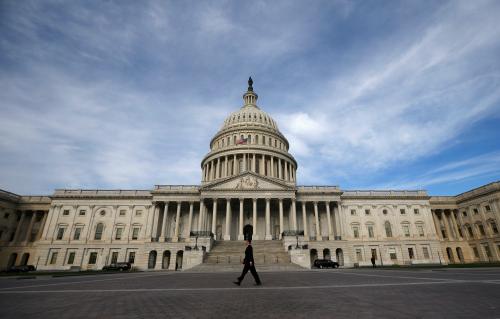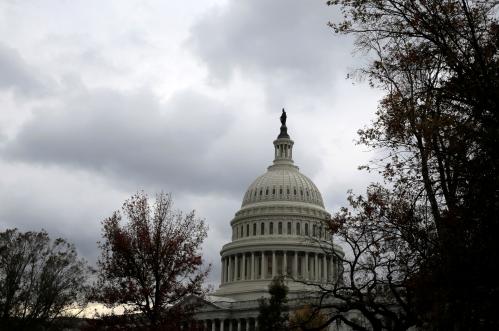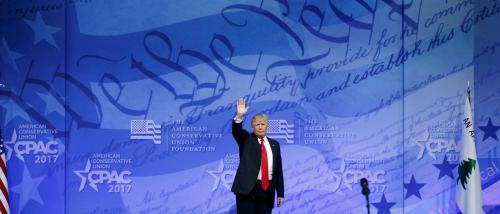 Vital Statistics on Congress is a regular publication of the Brookings Institution. Since its first publication in 1980, it has become a go-to reference guide for those interested in congressional affairs. This blog is the third in a series that will highlight interesting data trends in each chapter of the most recent update, released January 2017.
Vital Statistics on Congress is a regular publication of the Brookings Institution. Since its first publication in 1980, it has become a go-to reference guide for those interested in congressional affairs. This blog is the third in a series that will highlight interesting data trends in each chapter of the most recent update, released January 2017.
During the past half century, the personal backgrounds and demographic makeup of Congress have changed substantially. As shown in Vital Statistics Chapter 1: Demographics of members of Congress, members have become more diverse in terms of race and gender over time. Relevant interest groups like the NAACP have lauded this trend for making Congress better resemble the nation it represents. Political science research has shown that diversity is important for securing sufficient representation of minorities’ and women’s interests. But a separate demographic shift—the changing nature of occupations held by members of Congress before they become public servants—can also play a role in influencing policy outcomes.
In the 114th Congress, 231 members of the House of Representatives had previous occupations that fell under the “business or banking” category. In fact, this was the second most common prior occupation for House members behind “public service/ politics,” at 271 members. Nearly one-and-a-half times the number of members were coded under business or banking during the 114th Congress as were during the 107th Congress, just 15 years prior. Contrast this with the relatively steady number of members with agricultural backgrounds over the period (25 members in the 107th Congress, 25 members in the 114th Congress with slight variations in between) or those with aeronautics, educational, or law backgrounds (the counts for which have experienced only modest variation since the early 2000s). The same pattern holds true for the Senate, with 42 Senators listed under business or banking in the 114th Congress compared to 24 in the 107th, while the most other occupations remained relatively unchanged.
Political scientists have long been interested in the role of businesspeople in Congress. A study from 1962, simply titled “Businessmen in Politics”, discusses the origins of a movement to get more businesspeople involved in politics. The authors argue that the 1958 congressional elections brought an influx of pro-labor members to Congress, prompting a business-led counter-effort to the organizing work of trade unions and the AFL-CIO. The explicit goal of persuading businessmen to run for Congress and other political institutions (an endeavor which actually included a class offered by the Manufacturers Association of Syracuse designed to prepare businessmen to enter political life) was to ensure that business interests were protected against labor’s political influence. This strategy assumed, however, that people with business backgrounds would continue to advocate for the interests of business even after entering politics.
Do we have reason to believe this assumption is correct? Work by political scientist Nicholas Carnes suggests that individual Congress members’ class background, defined by their occupational history prior to entering political service, has a significant effect on their voting behaviors. Members of Congress who were employed in “profit-oriented professions” (e.g., farm owners, businesspeople, and other private sector workers) prior to taking office had a tendency to vote with more conservative economic positions than those who were in working-class occupations. Conversely, working-class members had a tendency to vote more liberally on economic issues than any other occupational group. The implication is that members are more likely to vote for policies that they believe will positively impact people of their own class background. Therefore, as hypothesized a half century ago, it can help to fill the congressional roster with players from your own team.
While businesspeople have substantially increased their presence in Congress, data suggest that members from some working-class backgrounds have also begun to serve over the past two decades. The Vital Statistics data indicate that the number of House members working in non-physician health care fields and in secretarial/clerical occupations, for example, have increased between the 107th Congress and the 114th Congress as well. Work by Carnes suggests that the gains made by women and racial minorities winning elected office may be linked to gains by the working class, and that reducing barriers to entry leads working-class candidates to greater success in seeking office. Just as a business association created a school to train businessmen to run for office in the 1950’s, the AFL-CIO has now set up its own candidate school to encourage working people to run for office. While other factors such as partisan control will still have a greater effect on whether Congressional action favors the working class in the future, it is worthwhile to note that reshaping the occupational background of the institution may also influence decision-making.






Commentary
Vital Stats: The growing influence of businesspeople in Congress
February 17, 2017